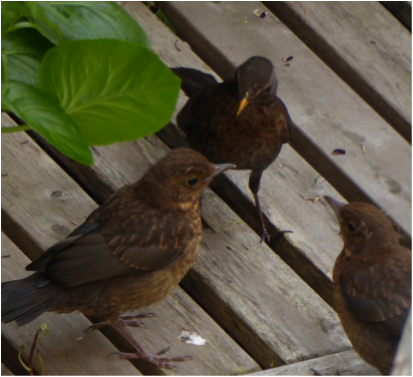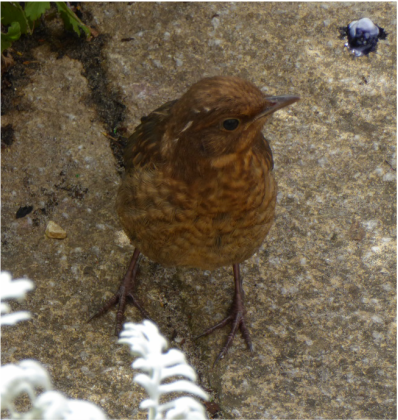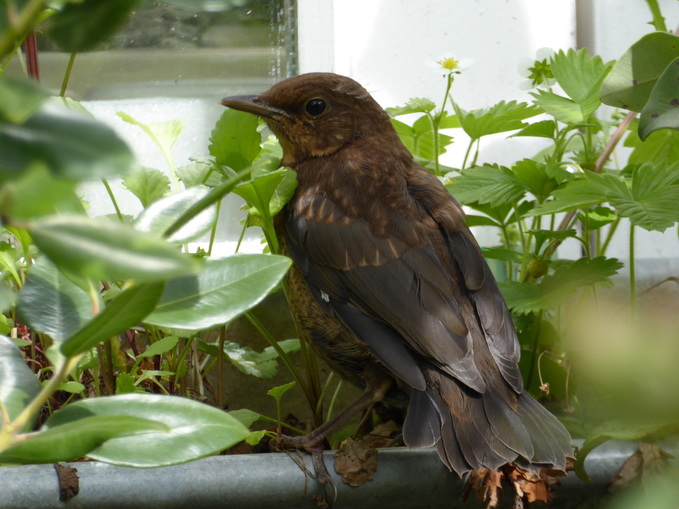On the terrace there is a small bowl that years ago I misguidedly bought at a discounter. It was billed as a "patio pond" and came complete with soil and four plants, a water lily amongst them. To this day the lily has never flowered but I can't blame it: the bowl is no more than 40 cm in diameter and the water no more than an inch or two deep. Moreover, as I do not top up every single day, the water level fluctuates heavily. To my immense surprise though, the water lily still survives, along with one other plant in there.
A pond the size of a dog's water bowl will still be a pond
But water lilies aren't the point of our "pond" as we still call it - only half aware of the inherent joke and delusion. Because, it still supports wildlife: bees, bumble bees, hoover flies, astonishing numbers of turquoise damselflies, and just as I write an enormous blue and green emperor dragonfly. But most obviously the birds love it: often it probably is the only puddle around nearby. Blue and great tits regularly come for a sip and a bath and so do our resident blackbirds.
The entire family routine is displayed before your eyes: Dad, Mum and the two chicks. Most of the day they seem to spend in our garden and very happily so. Little surprise there - it seems to be the most densely planted place on our street: a mad jumble of plants, far too congested but therefore with good protection and plenty of food for them. And in a dry spell I even might water the beds (as opposed to only the pots) just so the earthworms come up.
It always surprises me that the chicks, on leaving the nest, are almost as big as the adult birds already. But the little blackbirds are more speckled and scruffy and have much shorter tail feathers. Also, and rather funnily, they have a few very thin, fluffy white-ish feathers sticking out from their head - almost like a monk's tonsure or a long-eared owl. It makes them oddly look like their own grandpa!
When mum or dad comes, they scramble or flutter towards them, opening their beaks as wide as will go. Once they have been fed, they will hop after their parent, begging for more until the old bird simply flies off. Unlike human children though, who seem unable to be still for one second once they have learned how to crawl, the chicks happily sit motionless for long periods in the same spot - just waiting, contemplating perhaps, and surely taking in all the sounds and sights. Then a parent appears and the circle starts anew.
You learn to decipher their calls: A subdued "ziiiiii - ziiiiii" probably not just sounds like "Feeeed me!". When no adult bird is nearby, you'll often still hear a "Chirr. - Chirr. - Chirr.", very quietly. I guess the chick is either talking to itself as encouragement (It might be a bit scary, all alone, sitting on a branch or in some corner with your parents God knows where, only returning every now and then to stuff a caterpillar down your throat!) or seems to remind the world: "Here I am. Don't forget I'm still here."
Daddy blackbird certainly seems to have understood this. Sometimes it's almost as if he wants me to see him going about his business. When I'm sitting outside with my laptop he might even land a metre away from me, beak teaming with worms, as if to check "Hi, how are you? See how many worms I found?" - and will wait until I look up. With the chicks, I have to be careful though - they only flutter off when you inadvertently come too close. Like, pulling up a weed less then a metre away from them. Otherwise they just duck, stay silent and don't move. I worry I might accidentally splash them when watering with the hose. Last year I nearly trod on one! We both got a fright.
Guarding blackbird chicks can be a tiring job
Apart from happiness, I almost feel gratitude towards them for their trust and presence, for making their home here in this tiny, inner city plot. Usually, the old blackbird couple builds their nest in our neighbour's overgrown ivy wall. But since there is not much else there for them, they come to us for the rest of the day. The nest in the ivy wall is a constant drama as foxes and cats were soon on the trail. Several times we despaired of the "stupid" birds, seemingly unable to learn from their mistakes. Many a time there was the heartbreak to find the predators had managed to jump up high enough (or "fish" from the top of the wall) to get to either eggs or chicks. Most times we were alerted by the frenetically calling parents in the early morning hours: Tscheptscheptscheptscheptscheptscheptschep!
Last summer, my man woke to find a cat playing with one of the chicks. As shouting from the window didn't stop it, he ran out in his pyjamas, stood on a chair (to look over the fence) and shooed the beast from the neighbouring garden but it was too late. Now, being a frighteningly light sleeper, he wakes pretty much every night if a fox or cat is balancing along the boundaries. I wonder whether the blackbirds note this and appreciate the human guard? The current brood is even more special - it's the first that actually hatched in our garden.
With time though, I became concerned: was there something wrong? Were there no eggs or chicks after all? Peering through the leaves I could see neither a parent sitting on the nest, nor a chick, nor did I hear tiny chirps. Also, though I did see the adults occasionally arriving with food, it seemed considerably less
frequent than when they had been feeding their chicks in the neighbour's garden. But then, just ten days ago, I could suddenly make out two little heads between the leaves. Hooray! All was well. Good children, by the way - they put their beaks almost vertically in the air and kept very still and quiet. It was exactly what their mother had done when I once accidentally stood less than a metre away from her sitting on the nest. (I had totally forgotten about it and was watering, hose in hand, when I suddenly remembered, then - without moving - peered and spotted her.)
I noticed with previous generations that, as soon as they could flutter, the parents took their young away from the nest, moving around, hiding elsewhere. Probably so that cats and foxes had no reliable spot where to find them. So now these two chicks have left their nest, too. Somehow, I almost feel a motherly pride myself for those little blackbirds raised in our garden. Long may they escape foxes, cats, magpies or whatever else there may be lurking.



 RSS Feed
RSS Feed